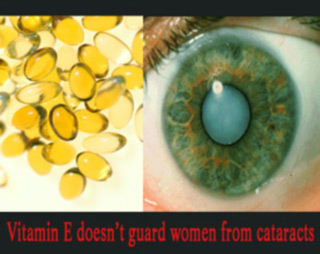
There has been a comprehensive study by researchers that states that vitamin E supplements might not guard women from cataracts. This examination by researchers during the Women’s Health Study (WHS) has revealed that women who consumed vitamin E supplements had similar changes and rates of developing cataracts as compared to those who didn’t consume vitamin E.
The individuals had an intake of 600 IU of vitamin E (every other day) and 100 mg of aspirin (every day) for almost a period of 10 years after which their case study was recorded. The history was recorded right from the cataract, cardiovascular disease, cancer prevention, cigarette smoking, alcohol consumption and use of multivitamins and on any other factors in health and lifestyle.
Dr. William G. Christen and his colleagues studied the information collected from 39,876 professional women aged 45 years or older. The results were that after 6.5 years of consuming only Vitamin E supplement or else antioxidant nutrients had caused a very little effect in causing cataracts in healthy patients.
Christen said, “Since age-related cataract develops over many years as a result of cumulative damage to the eye’s lens, longer timeframes might be necessary to see a benefit from antioxidant supplements”.
The research has been published in the May 2008 issue of Ophthalmology, the journal of the American Academy of Ophthalmology.
